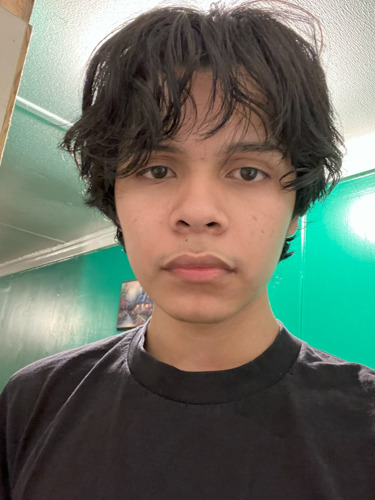by Emmanuel Lopez-Reyna
Outside the school, a sign stands erect, and all who ride the morning bus see it. On it is an image of a handgun overlaid with a crossed red circle, reading "No Concealable Weapons Allowed" – our only defense from a would-be intruder. The inside is inharmonious to those who spend their days there: clean white hallways decorated with the artwork and fruits of the labor of our student body clashing with the disarray in the bathrooms and the underfunded classrooms with resources often sourced by teachers or parents. Despite these incongruencies, no one here is in a place to complain as many opportunities are available here; if you have a future in mind, the school will make it so. Despite the lack of comfort afforded here, the school breathes life due to the staff and students who animate this impaired marionette and flow through its body, allowing it to stand.
The area surrounding the school is a quilt of differing backgrounds, spanning tax brackets and cultural roots, splitting those who, for centuries, held back the rights of others, slowly but surely altering the perception of South Carolina as a state obedient to certain "southern principles." This change was not the work of a government bent on changing its reputation; instead, the work of those working hard to dispel these connotations connected to the state while being under fire from an education department hellbent on a culture war, throwing a wrench in the education of children in South Carolina.
Under South Carolina Superintendent of Education Ellen Weaver, tone-deaf changes have been made that play to a vocal minority of politically charged parents who have extended their parental control to an entire state. In June 2024, the South Carolina Department of Education axed Advanced Placement African American Studies from high schools, removing the college credit it offered. Just one month later, the Board of Education passed Regulation 43-170, a book ban that targets books that those politically charged parents find offensive, frequently those featuring LGBTQ+ subject matter and people of color. This onslaught on education brought no additional AP courses and no substantial reforms in the education system, which ranks among the bottom ten in the nation according to U.S. News and World Report. The role of the SCDE is not to better the education of its citizens but to constrict it to the needs of ideological parents. We are slowly regressing to the South that many have worked to dispel, and if it isn't clear to you what that South is, examine the Palmetto State’s history; it'll become clear the prejudices interwoven in the fabric of our flag, waving high in the air, unconcerned with our attempts to look past it.
Throughout South Carolina, schools often break the status quo issued by the Board of Education, whose only care with these schools is to ensure they follow what they outline, ignoring issues in infrastructure and funding, leaving others to pick up the pieces. To answer the question, "How should we improve the state of South Carolina?," it is clear that it starts with our education. Our state is a collection of the experiences and best wishes of its people, those experiences and wishes limited by the restrictions on books and classes that venture out of our comfort zone and give us new perspectives on backgrounds foreign to our own. Our reliance on our Southern heritage has consistently landed us on the wrong side of history, from our secession from the union to our denial of civil rights up until the last moments, and this trend will continue as a result of an education system focused on enforcing political ideology rather than making a change in our education. Despite these flaws, to call for a complete abandonment of Southern culture would be a disservice, as Southern hospitality has fostered a greater linkage in the state’s communities than the attempts by the state to unite its citizens against authors and educators. It is important not to abandon what it means to us to be Southern but to dispel the connotations of what the South is to those who’ve seen the worst of it.
Sources
Jurado, Alexa, June 12, 2024. “SC ends AP African American Studies in public schools. Some say it’s ‘whitewashing history.’ The State newspaper. https://www.thestate.com/news/local/education/article289175359.html
Rankings: Education – States with the Best Education Systems. https://www.usnews.com/news/best-states/rankings/education

About Emmanuel Lopez-Reyna
Emmanuel Lopez-Reyna is a junior at May River High School in Bluffton.